30 may 2017
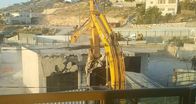
The Israeli authorities continue their measures aimed at expelling the Palestinian citizens from Jerusalem in order to change the demographic balance in the city in favor of the Jewish settlers through a series of policies, the latest of which was depriving the Jerusalemite Arab neighborhoods of vital services.
Haaretz newspaper reported on Tuesday that Ze'ev Elkin, Minister of Jerusalem Affairs and Environmental Protection excluded the Palestinian neighborhoods in East Jerusalem from a plan he prepared to improve cleanliness and environmental quality in Jerusalem.
The paper said that this decision was passed despite the fact that Elkin acknowledged that the health conditions in the Palestinian neighborhoods behind the separation wall, which are home to about 140,000 people, are difficult.
For its part, the Palestinian Water Company said that the Israeli company Mekorot does not supply the Jerusalemite neighborhoods behind the wall with enough water, adding that the Jerusalem municipality refuses to issue licenses for the establishment of new water networks there.
Member of the municipal committee of Kafr 'Aqab neighborhood in East Jerusalem, Munir Abu Ashraf, reported that water cuts in his neighborhood sometimes continue for five days. To confront this, the residents placed 1500-liter tanks on their roofs to fill them with water whenever it is available, he said, warning of the possible collapse of residential buildings due to the large number of tanks on their roofs.
According to the Hebrew TV channel Ten, there is a secret plan being developed by the Israeli National Security Council, with the support of the Prime Minister Benjamin Netanyahu, to separate Shu'fat Camp and Kafr 'Aqab neighborhood from the Jerusalem municipality.
Chairman of the Jerusalem neighborhoods committee, Munir Zagheir, complained that the Jerusalem municipality evades its duty toward the Jerusalem Arab neighborhoods under pretexts related to the security situation.
He explained that the residents of Kafr 'Aqab are facing many complications due to the lack of services, which affected water, infrastructure, and roads.
He noted that nearly 65,000 Jerusalemites, who have Israeli IDs, live in slums in Kafr 'Aqab and pay the property tax and health insurance for no services in return. He pointed to the presence of 12,000 citizens in the neighborhood who demand reunion with their families from whom they were separated due to the Wall.
Haaretz newspaper reported on Tuesday that Ze'ev Elkin, Minister of Jerusalem Affairs and Environmental Protection excluded the Palestinian neighborhoods in East Jerusalem from a plan he prepared to improve cleanliness and environmental quality in Jerusalem.
The paper said that this decision was passed despite the fact that Elkin acknowledged that the health conditions in the Palestinian neighborhoods behind the separation wall, which are home to about 140,000 people, are difficult.
For its part, the Palestinian Water Company said that the Israeli company Mekorot does not supply the Jerusalemite neighborhoods behind the wall with enough water, adding that the Jerusalem municipality refuses to issue licenses for the establishment of new water networks there.
Member of the municipal committee of Kafr 'Aqab neighborhood in East Jerusalem, Munir Abu Ashraf, reported that water cuts in his neighborhood sometimes continue for five days. To confront this, the residents placed 1500-liter tanks on their roofs to fill them with water whenever it is available, he said, warning of the possible collapse of residential buildings due to the large number of tanks on their roofs.
According to the Hebrew TV channel Ten, there is a secret plan being developed by the Israeli National Security Council, with the support of the Prime Minister Benjamin Netanyahu, to separate Shu'fat Camp and Kafr 'Aqab neighborhood from the Jerusalem municipality.
Chairman of the Jerusalem neighborhoods committee, Munir Zagheir, complained that the Jerusalem municipality evades its duty toward the Jerusalem Arab neighborhoods under pretexts related to the security situation.
He explained that the residents of Kafr 'Aqab are facing many complications due to the lack of services, which affected water, infrastructure, and roads.
He noted that nearly 65,000 Jerusalemites, who have Israeli IDs, live in slums in Kafr 'Aqab and pay the property tax and health insurance for no services in return. He pointed to the presence of 12,000 citizens in the neighborhood who demand reunion with their families from whom they were separated due to the Wall.
14 may 2017
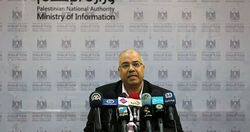
The Water and Natural Resources Authority in the Gaza Strip warned on Sunday of a major shortage in drinking water as a result of the frequent power cuts.
Deputy head of the Water Authority, Mazen al-Banna, told a press conference on Sunday that the Gaza Strip "is suffering from severe water shortage and pollution due to the depletion of the underground reservoir which is no longer drinkable".
Banna stated that many donor countries stopped supporting the Gaza Strip after Hamas won the legislative elections in 2006, but they began to deal with local institutions since the beginning of 2012 by funding some desalination projects.
The Water Authority has drawn many development plans based mainly on the construction of sewage treatment plants and the establishment of seawater desalination plants, according to Banna. However, the blockade and the absence of the financial support stand as a major obstacle to these projects.
Banna held Israel fully responsible for the water crisis the Palestinian people are suffering in the occupied West Bank and Gaza Strip, noting that 90% of the water resources are under Israeli control, and pointed out that an Israeli settler gets 7 times the amount of water provided to a Palestinian citizen.
He called for lifting the siege imposed on Gaza which has been tightened recently through the latest measures taken by the Palestinian Authority president Mahmoud Abbas and warned of its negative impact on the various aspects of life.
Deputy head of the Water Authority, Mazen al-Banna, told a press conference on Sunday that the Gaza Strip "is suffering from severe water shortage and pollution due to the depletion of the underground reservoir which is no longer drinkable".
Banna stated that many donor countries stopped supporting the Gaza Strip after Hamas won the legislative elections in 2006, but they began to deal with local institutions since the beginning of 2012 by funding some desalination projects.
The Water Authority has drawn many development plans based mainly on the construction of sewage treatment plants and the establishment of seawater desalination plants, according to Banna. However, the blockade and the absence of the financial support stand as a major obstacle to these projects.
Banna held Israel fully responsible for the water crisis the Palestinian people are suffering in the occupied West Bank and Gaza Strip, noting that 90% of the water resources are under Israeli control, and pointed out that an Israeli settler gets 7 times the amount of water provided to a Palestinian citizen.
He called for lifting the siege imposed on Gaza which has been tightened recently through the latest measures taken by the Palestinian Authority president Mahmoud Abbas and warned of its negative impact on the various aspects of life.
4 may 2017
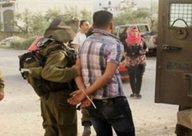
Israeli soldiers invaded, Thursday, Bardala village, in the West Bank’s Northern Plains, and abducted two Palestinian men.
The WAFA Palestinian News Agency said the soldiers abducted Aziz Sawafta and Mahmoud Sawafta, and took them to an unknown destination.
The army said it invaded the village to look for what it called “unlicensed irrigation networks” used by the Palestinian farmers.
Last week, the army invaded the village, and destroyed a water pipeline in the village under the same allegations.
While illegal Israeli colonies, built on Palestinian lands in the area have uninterrupted, abundant water supplies, the Palestinians, and their agricultural lands, remain without sufficient water resources due to Israel’s illegal policies.
The WAFA Palestinian News Agency said the soldiers abducted Aziz Sawafta and Mahmoud Sawafta, and took them to an unknown destination.
The army said it invaded the village to look for what it called “unlicensed irrigation networks” used by the Palestinian farmers.
Last week, the army invaded the village, and destroyed a water pipeline in the village under the same allegations.
While illegal Israeli colonies, built on Palestinian lands in the area have uninterrupted, abundant water supplies, the Palestinians, and their agricultural lands, remain without sufficient water resources due to Israel’s illegal policies.
3 may 2017
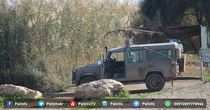
Israeli Occupation Forces (IOF) attacked a Palestinian farmer, Ashraf Abu Dhaile, on Wednesday afternoon in al-Bekaia area in the northern Jordan Valley. The IOF soldiers confiscated his tractor and a water tank.
Local sources told the PIC reporter that the IOF troops handed him a summons after confiscating his properties.
The sources added that Israeli forces intensively target the area of the northern Jordan Valley. They deliberately ban Palestinian inhabitants from using water springs in the area and intentionally ruin water networks.
The Palestinian citizens then have to transfer water via expensive water tanks which usually get confiscated by the IOF soldiers as well.
Local sources told the PIC reporter that the IOF troops handed him a summons after confiscating his properties.
The sources added that Israeli forces intensively target the area of the northern Jordan Valley. They deliberately ban Palestinian inhabitants from using water springs in the area and intentionally ruin water networks.
The Palestinian citizens then have to transfer water via expensive water tanks which usually get confiscated by the IOF soldiers as well.
28 apr 2017
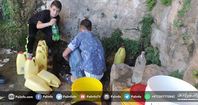
The Israeli occupation army on Thursday cut off water to Bardala village in the Northern Jordan Valley, particularly northeast of Tubas.
Eyewitnesses told the Palestinian Information Center (PIC) that Israeli soldiers stormed the Palestinian village and severed water pipelines supplying plantations and homes.
Earlier, the head of the Israeli army’s civil administration had accused the villagers, in a warning message delivered to them, of stealing Israeli water and vowed to prevent what he described as the phenomenon of water theft.
Eyewitnesses told the Palestinian Information Center (PIC) that Israeli soldiers stormed the Palestinian village and severed water pipelines supplying plantations and homes.
Earlier, the head of the Israeli army’s civil administration had accused the villagers, in a warning message delivered to them, of stealing Israeli water and vowed to prevent what he described as the phenomenon of water theft.
24 apr 2017
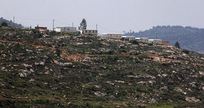
An Israeli military camp set up in Umm Zuqa, in the northern Jordan Valley, supplied a nearby illegal settlement outpost with water.
The settlement outpost, which was supplied with water, was built in early January 2017 on Palestinian private land, after Israeli settlers brought a herd of 30 cows to the area.
Israel’s coordinator for the government affairs claimed that an order was issued to stop construction works. However, the settlement was established soon after and has been expanding at the expense of Palestinian land lots.
The Israeli authorities further installed several water tanks and solar panels in the outpost. Dozens of trees have also been planted.
Activists from the leftist Machsom Watch group said Israeli settlers have showed up in the settlement quite frequently.
Last week, a pipe running from the largest water tank in the settlement outpost and whose edges were covered with mud was detected in the area in what was believed to be a sign of Israeli attempts to conceal field evidence of illegal settlement expansion.
The settlement outpost, which was supplied with water, was built in early January 2017 on Palestinian private land, after Israeli settlers brought a herd of 30 cows to the area.
Israel’s coordinator for the government affairs claimed that an order was issued to stop construction works. However, the settlement was established soon after and has been expanding at the expense of Palestinian land lots.
The Israeli authorities further installed several water tanks and solar panels in the outpost. Dozens of trees have also been planted.
Activists from the leftist Machsom Watch group said Israeli settlers have showed up in the settlement quite frequently.
Last week, a pipe running from the largest water tank in the settlement outpost and whose edges were covered with mud was detected in the area in what was believed to be a sign of Israeli attempts to conceal field evidence of illegal settlement expansion.
15 apr 2017
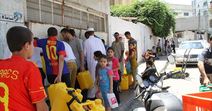
Maariv newspaper has said that 200 Palestinian towns and villages in Area C of the West Bank suffer from serious water scarcity and are isolated from the Israeli water network
According to the Israeli newspaper, the water crisis in these Palestinian areas has coincided with shrinking water resources in the Palestinian Authority territories of the West Bank and the Gaza Strip.
It highlighted the water crisis in Gaza, saying its network of water resources are collapsing, especially due to the increasing salinity levels in its aquifer as seawater are seeping in from the Mediterranean.
Haaretz described the water problem in Gaza as one of the factors that would lead the fragile situation in the besieged enclave to explode.
The Oslo Accords, which were signed between Israel and the Palestine Liberation Organization (PLO), has granted Israel control over the West Bank’s water sources and discriminates in how the water is divided.
Under the agreements, Israel gets 80 percent of the water from the West Bank mountain aquifer (one of three underground resources shared by Israelis and Palestinians), while the rest goes to the Palestinians.
The agreements also set no limit on the amount of water Israel can take, but limits the Palestinians to 118 million cubic meters from the wells that existed prior to the accords, and another 70 million to 80 million cubic meters from new drilling.
However, for various technical reasons and unexpected drilling failures in the eastern basin of the aquifer (the only place the agreement allows the Palestinians to drill), the Palestinians produce less water than the agreements set.
According to B’Tselem, as of 2014, the Palestinians are only getting 14 percent of the aquifer’s water.
According to the Israeli newspaper, the water crisis in these Palestinian areas has coincided with shrinking water resources in the Palestinian Authority territories of the West Bank and the Gaza Strip.
It highlighted the water crisis in Gaza, saying its network of water resources are collapsing, especially due to the increasing salinity levels in its aquifer as seawater are seeping in from the Mediterranean.
Haaretz described the water problem in Gaza as one of the factors that would lead the fragile situation in the besieged enclave to explode.
The Oslo Accords, which were signed between Israel and the Palestine Liberation Organization (PLO), has granted Israel control over the West Bank’s water sources and discriminates in how the water is divided.
Under the agreements, Israel gets 80 percent of the water from the West Bank mountain aquifer (one of three underground resources shared by Israelis and Palestinians), while the rest goes to the Palestinians.
The agreements also set no limit on the amount of water Israel can take, but limits the Palestinians to 118 million cubic meters from the wells that existed prior to the accords, and another 70 million to 80 million cubic meters from new drilling.
However, for various technical reasons and unexpected drilling failures in the eastern basin of the aquifer (the only place the agreement allows the Palestinians to drill), the Palestinians produce less water than the agreements set.
According to B’Tselem, as of 2014, the Palestinians are only getting 14 percent of the aquifer’s water.
5 apr 2017
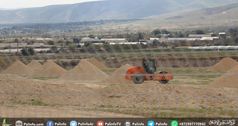
The Israeli occupation authorities (IOA) on Tuesday evening ordered a Palestinian citizen to stop the underway construction of a water well in eastern Bethlehem province.
Anti-settlement activist Hassan Brijiya said the Israeli antiquities authority handed over a stop-construction order, targeting a water well, to the Palestinian citizen Mohamed Ali Zawahra.
The cease-construction notification was issued on account that the area falls under the Israel-run category.
Anti-settlement activist Hassan Brijiya said the Israeli antiquities authority handed over a stop-construction order, targeting a water well, to the Palestinian citizen Mohamed Ali Zawahra.
The cease-construction notification was issued on account that the area falls under the Israel-run category.
